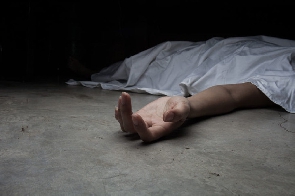Opinions of Monday, 7 June 2021
Columnist: Samuel Yaw Agyemang-Badu
NaSIA must ensure pre-tertiary educational institutions have adequate sanitary facilities
It is refreshing, great news and excitement as an Environmental Health Practitioner upon hearing the current regime of licensing of Pre-tertiary schools by National Schools Inspectorate Authority (NaSIA) before they could operate in the country.
This is a wonderful step in the very right direction and the way to go with regards to the achievement of the Sustainable Development Goals (SDG): four (4) quality education, six (6) clean water and sanitation, and three (3) good health and well-being in Ghana.
However, I would like to call on the NaSIA to strictly ensure that adequate and standard sanitary facilities (toilets, waste bins and handwashing facilities) are provided in all Pre-tertiary Schools (both public and private) as a mandatory-checklist-requirement before issuing them with license to operate as part of the registration and licensing of Pre-tertiary schools in the country by the Authority.
According to the Media Coalition against Open Defecation (M-CODe), thirty percent (30%) of basic schools in Ghana lack toilet facilities. However, the remaining seventy percent (70%) who are somehow fortunate also have lavatories that are badly conditioned.
The same challenge is noted to be faced with majority of health institutions, such that a number of community health-based planning services (CHPS) Compounds, Clinics and Hospitals in the country at the moment has no toilet facility and that staff resort to open defaecation (OD) in the bush as the only option for survival.
In 2008, the Education Act, 778 established the National Schools Inspectorate Authority, formally known as National Inspectorate Board (NIB) with 3 main responsibilities:
(a) Schools Inspection,
(b) Schools Evaluation and
(c) Enforce Standards.
The National Schools Inspectorate Authority (NaSIA) is an agency of the Ministry of Education mandated by Parliament to provide an independent external evaluation of the quality and standards in basic and second cycle educational institutions in the country on a periodic basis.
According to NaSIA, a New and an Existing Schools are any Pre-tertiary schools established after the passage of and/or established or operating before the passage of the Education Regulatory Bodies Act 2020 (Act 1023).
The NaSIA is therefore responsible for registering and licensing all Pre-tertiary educational and training institutions and facilities in Ghana.
Currently, available statistics has it that one out of every five Ghanaian defecates outside a toilet facility each day.
This represents close to 6 million people. It is also estimated that the act of open defecation (OD) cost the country some US$79 million annually through tourism loss, water pollution and death among others.
Provision of adequate and standard sanitary facilities in our Pre-tertiary schools will go a long way to prevent Open Defecation (OD) on the School compounds and also ensure and inculcate handwashing practices among the pupils and children after using the toilet as well as proper waste management practices, to prevent infectious disease outbreaks such as Cholera and also to prevent the COVID-19 disease we are currently fighting as a nation.
Moreover, the provision of adequate waste bins in this Pre-tertiary educational institutions will lead to proper waste management practices by the pupils and children and as a result there will be serene, clean and conducive environment free of filth at all times, safe environment for human habitation (staff, students, clients and visitors), improve the standards of sanitation in and around the schools’ compound in order to prevent environmental and sanitation related diseases (such as cholera, typhoid, dysentery, malaria, etc.) in order to promote teaching and learning.
According to Hogue (2003) and Global Handwashing Day (GHWD, 2008), the high prevalence of diarrheal diseases as well as other infectious diseases amongst students in that matter, school children due to poor hand washing, personal hygiene and sanitation remains a distress on the public health agenda in many countries and continents. However, hand washing with soap is professed among the most effective and inexpensive methods to prevent diarrheal diseases and pneumonia in combination are accountable for the majority of child deaths worldwide each year.
The Public Private Partnership for Hand Washing (PPHW, 2014) opined that, hand washing is a cornerstone of public health, and a new hygienic practice as well as sanitary services were basic drivers of the sharp drop in deaths from communicable ailments in developed countries in the late 19th century.
Alongside with the proper management of human faeces and the supply of sufficient quantities of clean water, hand washing with soap has been established among the most effective methods to prevent diarrheal infections and has been also the cheapest technique.
Curtis et al. (2009), assume that when hand washing turns out to be part of daily habits in childhood it does not easily disappear. Hence, schools form an ideal foundation for skills-based hygiene education, where children could acquire and put up with life-long hygiene practices.
Furthermore, I will humbly urge the NaSIA to continue to collaborate with the Metropolitan, Municipal, and District Assemblies (MMDAs) as well as the Ghana Health Service and Ghana Education Service to adequately resource and support the Registered Environmental Health Officers under the MMDAs and the Ghana Health Service to effectively enforce those requirements stipulated in Section 54 & 56 of the Public Health Act, 2012 (Act 851) by conducting regular inspections of the Pre-tertiary schools to ensure that available sanitary facilities are in very good conditions for the patronage of pupils and teachers as well as strict adherence and compliance of the COVID-19 prescribed measures and protocols.
It is my kindest appeal to the NaSIA to create an effective working collaboration between the Authority and the Environmental Health and Sanitation Departments/Units of the MMDAs and endeavour to include a registered Environmental Health Officer among the Schools Inspectorate Team (Team of Inspectors) of the NaSIA that recommends the issuance of license to Pre-tertiary schools after the inspections are carried out.
According to Section 19 of the Public Health Act, 2012, (Act 851), an Environmental Health Officer is a health professional who is involved in health promotion, education and who controls activities that have adverse consequences on the environment, public health and safety.
In Ghana, Environmental Health Professionals’ (Officers) training and practice is regulated by the Allied Health Professions Council of Ghana (AHPC) under the Health Professions Regulatory Bodies Act, 2013 (Act 857.
Amongst the duties and responsibilities of Environmental Health Officers are: Inspects, controls, and manages sanitation in public places; Assists in community-based environmental sanitation campaigns and public education; Educate the public on environmental health issues and regulations and Enforces environmental health laws, acts and policies.













